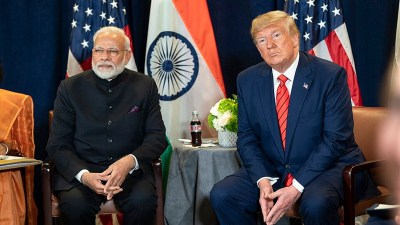Blair and Asian friends
They are proclaimed the paragons of success and endeavour, whose rise from rags to riches has seen them take their place in British folklore...

They are proclaimed the paragons of success and endeavour, whose rise from rags to riches has seen them take their place in British folklore as the epitome of hard-working immigrants.
Having had his fingers burnt with the pop pack, Prime Minister Tony Blair decided to rub shoulders with the ethnic pack at a gathering of Britain8217;s 200 wealthiest Asians in central London. Accompanied by his wife, Cherie, who wore an embroidered sari, Blair praised entrepreneurs at the dinner, held to mark the release of a list of Britain8217;s wealthiest Asians.
Between them, they are worth 12 billion, own a number of household brands and employ 300,000 people around the world. And Blair described them as quot;a credit to the country as a whole, not just the Asian communityquot;.
Leading the way are Lakshmi and Usha Mittal, who own a multi-national steel company worth Aring;ldquo;2 billion, followed by the Hinduja family, worth Aring;ldquo;1.2 billion, with extensive interests in industry and oil.
Others include 21-year-old Rueben Singh, worth anestimated Aring;ldquo;45 million, who owns a fashion accessory chain, and Shami Ahmed, owner of the Joe Bloggs fashion label, valued at Aring;ldquo;60 million.
The presence of the Blairs was proof of Labour8217;s keenness to woo wealthy Asians, who have traditionally favoured the Tories and seen Labour as a hindrance rather than a help to business. But as Blair tucked into his samosas, surrounded by the super-rich, the list, and Labour8217;s support for it, left others in the Asian community with a sour taste in their mouths.
Campaigners claim the list paints a misleading picture of the success of Britain8217;s Asian community.
Few in the top 10 made their money in Britain and many on the list come from wealthy families. Many originated from east Africa, and had made substantial money before coming to Britain.
Suresh Grover, of the Southall Monitoring Group in south London, said: quot;While there is no doubt that there are some success stories, we also have to ask the question, at what price? Many Asian workers are poorly paid and work interrible conditions, often in companies owned by other Asians. At the end of the day, a businessman is a businessman and it doesn8217;t matter what the race is.quot;
Most successful Asian businesses are in the food, retail and textile areas, traditionally poorly paid with limited job security.
According to the latest government figures, unemployment rates for people of Pakistani and Bangladeshi origin stand at 22 per cent compared with the national average of about 6 per cent.
Kamaljeet Jandu, policy worker on ethnic issues at the Trades Union Congress, said: quot;We have a situation where a few people have done well but the reality is totally different for the majority of Asians. This list does not give a complete picture and there is a danger of replacing old stereotypes with new ones. Not all Asians are wealthy and many have limited opportunities.quot;
Sarwar Ahmed, publisher of Eastern Eye newspaper which compiled the super-rich list, said: quot;There are vital social issues that affect the Asian community,but it doesn8217;t mean that everything we do has to be referred back to them. This list shows the changing nature of our community.quot;
The Observer News Service
- 01
- 02
- 03
- 04
- 05































